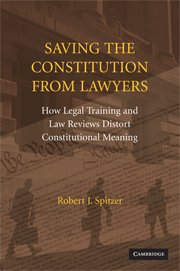 Saving the Constitution from Lawyers
Saving the Constitution from Lawyers Introduction
Published online by Cambridge University Press: 05 June 2012
Summary
A few years ago, I read a lengthy article in a prominent law journal about the constitutional power to declare war. The article ably presented opposing views regarding the enduring debate between those who argue for congressional pre-eminence over war-related decisions and those who believe that the president possesses great war-making discretion. But, the author offered a startling categorical finding that he said “all scholars have missed”: namely, that “the Founders denied the President a veto over congressional decisions to wage war….” This finding was, in turn, offered by the author as decisive support for greater congressional power over war-related decisions. “Wow,” I thought. Had the author uncovered a previously unknown letter by the likes of James Madison, for example, stating in unambiguous terms that declarations of war could not be vetoed by the president? Such a finding would be of major historical and constitutional significance. And, was it true that all scholars had missed this finding?
On its face, such a claim would seem to contradict a straight reading of the Constitution. According to Article I, sec. 7, “Every bill which shall have passed the House of Representatives and the Senate, shall, before it becomes a law, be presented to the President of the United States” for signature or veto.
- Type
- Chapter
- Information
- Saving the Constitution from LawyersHow Legal Training and Law Reviews Distort Constitutional Meaning, pp. 1 - 8Publisher: Cambridge University PressPrint publication year: 2008
